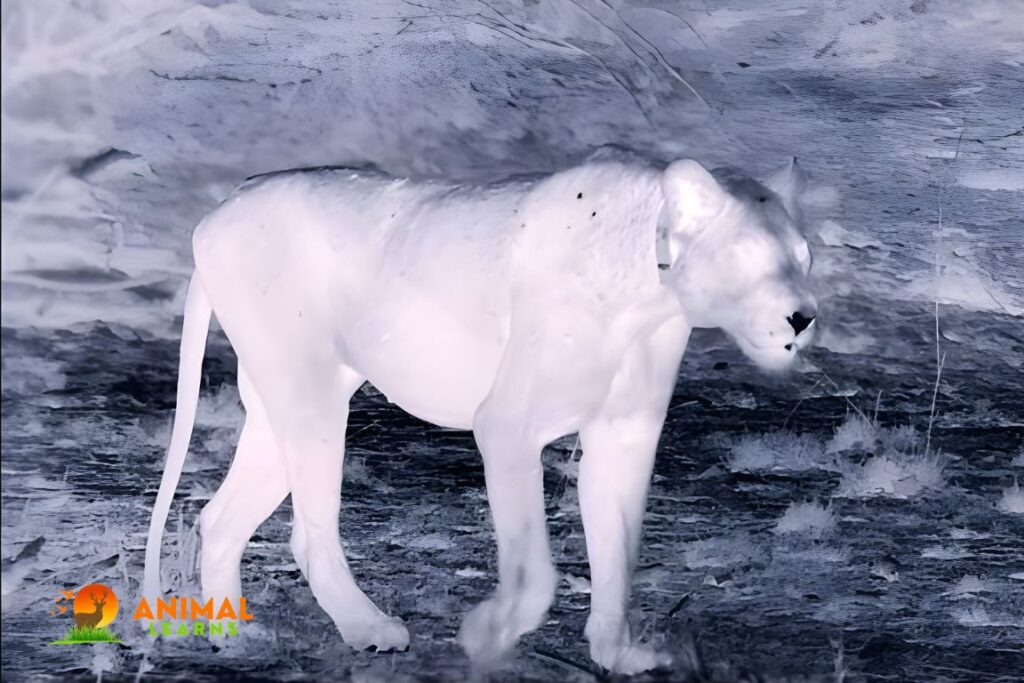Are Lions Colorblind? Color Perception in Lions

Are lions colorblind? Lions, known for their beauty and aggression, have a unique form of color blindness compared to humans. However, there is a long-standing myth that lions are colorblind.
Even though lions don’t have an as good color vision as humans do, they nevertheless see color. It is essential to comprehend lion eyesight because it provides important information on how they hunt, interact with other animals, and generally survive in their natural environment.
Lions (Panthera leo) are apex predators known for their carnivorous diet, primarily consisting of ungulates such as zebras and wildebeests. Lions are native to various parts of Africa, with their range extending from savannahs and grasslands to woodlands and scrublands.
Are Lions Colorblind?
Contents
- 1 Are Lions Colorblind?
- 2 What Colors Can Lions See?
- 3 What Colors Lions Can’t See?
- 4 Why Do Lions’ Eyes Glow in the Dark?
- 5 Can Lions See in the Dark?
- 6 Can Lions See Red?
- 7 The Myth of All Lions Being Colorblind
- 8 The Scientific Explanation: Why Are Lions Color Blind?
- 9 Lion Eye vs. Human Eye
- 10 The World Through a Lion’s Eyes
- 11 How do lions hunt?
- 12 Does Being Colorblind Affect Lions’ Ability To Hunt?
- 13 FAQs
Whereas most animals, including lions, are not as color-blind as humans are, they are somehow capable of seeing color. Lions have dichromatic vision, which allows them to understand combinations of two colors, therefore they are not color blind.
Lions with dichromatic vision can differentiate between different colors because they have two cones in their eyes. A large number of animals, including lions, have two cones, so that’s perfectly normal because humans have three cones and can see a larger range of colors.
What Colors Can Lions See?
Incredibly, lions and many other kinds of creatures have a distinct color vision system that sets them apart from humans. Lions see the world in hues of blue and green, using just two types of cones, but humans see color predominantly through three types of cone cells that are sensitive to red, green, and blue wavelengths.
One interesting aspect of their evolutionary adaption is this variation in color perception. Surprisingly, this visual change and their keen sense of low light give them a unique advantage in their native environment.
Lions can see with exceptional clarity that is superior to human eyesight because their eyes are adapted to the unique environmental conditions of the savannah. This includes the ability to identify possible threats, competitors, and prey.
What Colors Lions Can’t See?
Lions, while not colorblind in the conventional sense, have limited color perception. Their vision primarily centers around shades of blue and green. However, they struggle to distinguish between red and brown colors. This unique adaptation is due to the composition of their retinal cells.
While they may not fully appreciate the rainbow of hues as humans do, their vision is well-suited for detecting the movements of prey in the savanna, where these hues often dominate the landscape.
Why Do Lions’ Eyes Glow in the Dark?

Lions’ eyes possess a remarkable feature that can captivate observers during nighttime encounters. The phenomenon of their eyes glowing in the dark, often seen as a greenish or yellowish glow, is attributed to the presence of a layer of cells called the tapetum lucidum behind the retina.
This layer reflects and intensifies the ambient light, enhancing their night vision and enabling them to see clearly in low-light conditions. The eerie yet fascinating glow of a lion’s eyes is an evolutionarily honed adaptation that gives them the upper hand during their nocturnal activities, especially when embarking on nighttime hunts.
Can Lions See in the Dark?
Exploring the realm of nocturnal lion eyesight, we discover an amazing adaption that helps them make their way through the pitch-black savannah. Their distinct multiple pupils, the tapetum lucidum, which reflects light back through the retina, and improved rod cells for low-light sensing are among the characteristics that contribute to this capacity.
Together, these evolutionary wonders provide lions with remarkable night vision, which helps them hunt and protect their prides at night. Additionally, the attractive nighttime glimmer in their eyes is thought to be caused by ambient light reflecting off the tapetum lucidum, giving insight into their nightly activity in the African bush.
Can Lions See Red?
As the top predators in the African savanna, lions have developed a distinctive visual adaption. They are not completely colorblind, but their eyesight is mostly in the blue and green range, thus they have trouble distinguishing red from green.
Red has great significance in the wild, especially when it comes to lion behavior. Red frequently denotes blood in nature, signifying possible prey. Lions are known to become more vigilant and to activate their hunting instincts when they come into contact with the color red.
This relationship provides a fascinating window into the complex behavior of these animals and the art of adaptation in the natural world.
The Myth of All Lions Being Colorblind
Permit me to dispel a popular myth: lions are not inherently colorblind. As an experienced researcher in the animal realm, I have to stress that there is an amazing range of differences in color vision amongst several species of lions.
It’s true that lions see differently from humans, but that doesn’t mean that they have a monochrome vision. Examining the adaptations that have developed within different lion species to allow them to flourish in their unique settings is necessary to fully comprehend this variety.
The complex network of color vision and evolutionary survival techniques creates a fantastic picture of the varied world of lions.
The Scientific Explanation: Why Are Lions Color Blind?

This raises the question of whether are lions colorblind, The same question arises as to why are lions color blind. Because of the way their eyes work and the kinds of photoreceptor cells they have, lions and many other animals have restricted color vision.
Their absence of cones, a particular kind of photoreceptor that is in charge of identifying various hues in the visible spectrum, is the main cause of their poor color vision. Rather, lions mostly use rods, which are designed for seeing in low light.
Lion Eye vs. Human Eye
| Characteristic | Lion Eye | Human Eye |
| Number of cone types | 2 (Dichromatic) | 3 (Trichromatic) |
| Color vision | Dichromatic (can see blue and green, but not red) | Trichromatic (can see red, green, and blue) |
| Night vision | Excellent | Good |
| Field of view | 280-290 degrees | 180 degrees |
| Pupil shape | Vertical slit | Round |
| Tapetum lucidum | Yes | No |
Other important information:
- Lions have a higher rod-to-cone ratio than humans, which gives them better night vision.
- Lions have a wider field of view than humans, which helps them to spot prey and predators.
- Lions have vertical slit pupils, which help to protect their eyes from the sun’s glare.
- Lions have a tapetum lucidum, which is a reflective layer of tissue behind the retina that helps to reflect light back through the retina, giving them better night vision.
The World Through a Lion’s Eyes
Of course, let’s explore lions’ remarkable sense of vision. With a vision field of about 290 degrees, these magnificent animals can see a broad overview of their environment. Their remarkable range of vision increases their capacity to identify movement and possible prey, especially in the daytime.
The ability to detect food up to 2 miles away is a unique adaptation that has evolved over time and considerably improves lions’ hunting abilities.
Furthermore, their ability to see a large area is essential to their social interactions as it enables them to stay in visual touch with other pride members when participating in organized hunts and other group activities.
How do lions hunt?

Lions are recognized for their exceptional hunting abilities, frequently demonstrating well-coordinated cooperation to capture their prey. The pride’s main hunters, the lionesses, usually choose a cunning tactic.
They use the natural cover of the thick grass to their advantage, crouching low to get as near to their target as they can, all while considering their limited color vision, leading us to wonder, “Are lions colorblind?”
They launch themselves toward their target, hoping to come within striking range, with a powerful burst of speed. When they have located their prey, the lionesses cooperate to surround and subdue the victim, biting them quickly and fatally with their strong jaws and keen claws.
As a result of their gregarious disposition and ability to cooperate as a team during hunts, lions are among the most successful predators on the African savanna.
Does Being Colorblind Affect Lions’ Ability To Hunt?
Lions’ ability to hunt is not appreciably hampered by their limited color vision, as they excel in other sensory realms. For efficient hunting, lions rely on additional visual and sensory signals.
Their preferred nighttime hunting method depends on their exceptional night vision. To find and pursue food, lions also rely on their acute sense of hearing, scent, and motion detection abilities.
In their native environments, they are apex predators due to their tremendous hunting abilities, even though they may have trouble differentiating between particular hues. “Are lions colorblind” is a question often posed, but it’s clear that their hunting prowess extends beyond color perception.
FAQs
Are lions completely colorblind?
No, lions are not completely colorblind. They have limited color vision, primarily in shades of blue and green.
What colors can lions see?
Lions can perceive shades of blue and green, but they have difficulty distinguishing between red and brown colors.
Can lions see in the dark?
Yes, lions have exceptional night vision due to a high number of rod cells in their eyes, which makes them well-adapted for hunting during low-light conditions.
How does lion vision compare to human vision?
Lions have better night vision but inferior color discrimination compared to humans, who have a wider range of color perception.
Do all lions have the same level of color vision?
No, there can be variations in color vision among different lion species. Some may have slightly different visual capabilities, but all lions share the basic characteristics of limited color vision.












